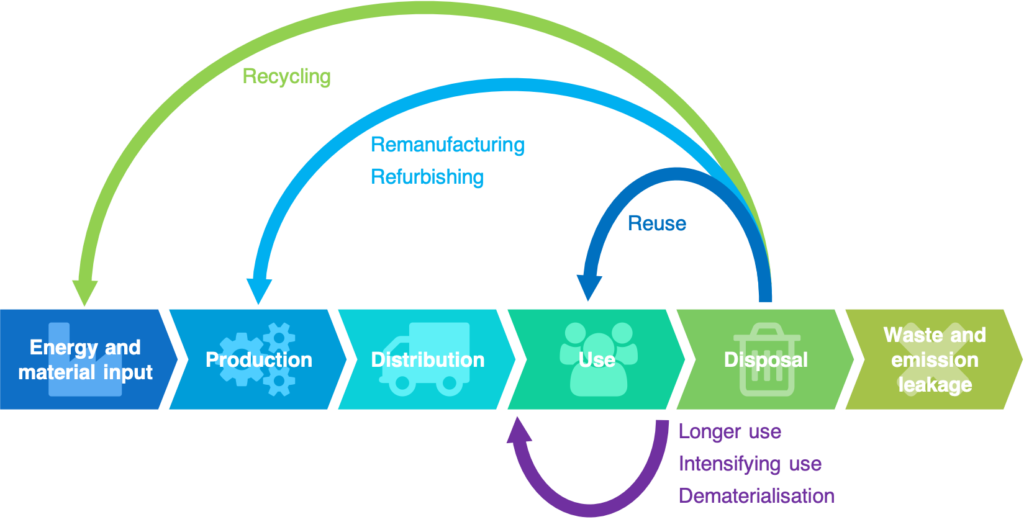
Circular Economy Gains Momentum as Businesses Embrace Sustainable Practices

The concept of a circular economy, which aims to minimise waste and maximise resource efficiency, is gaining traction across industries. Businesses are increasingly adopting sustainable practices, such as recycling, reusing, and refurbishing, to reduce their environmental impact. This article examines the growing trend of circular economy practices, showcasing success stories of companies that have embraced this model and discussing the benefits it offers for both the environment and the bottom line.
The concept of a circular economy has gained significant momentum in recent years as businesses strive to embrace sustainable practices and minimise their environmental impact. This article explores the growing trend of circular economy practices, highlighting success stories from companies that have adopted this model. By implementing strategies such as recycling, reusing, and refurbishing, businesses are not only reducing waste but also reaping the benefits of improved resource efficiency and long-term profitability.
1. The Rise of the Circular Economy:
The circular economy represents a shift away from the traditional linear “take-make-dispose” model towards a more sustainable approach. Instead of viewing resources as disposable, the circular economy promotes a system in which materials and products are kept in use for as long as possible. This approach aims to extract maximum value from resources, minimise waste generation, and reduce the overall environmental impact.
2. Sustainable Practices in Action:
Numerous companies have embraced circular economy practices and have witnessed tangible benefits. One example is a leading electronics manufacturer that implemented a product take-back program, allowing customers to return old devices for refurbishment or recycling. By doing so, the company not only reduced electronic waste but also recovered valuable materials, which could be reused in the production of new devices.
3. Recycling and Resource Recovery:
Recycling plays a crucial role in the circular economy by diverting materials from landfills and reintroducing them into the production cycle. Many businesses have established robust recycling programs, both internally and in partnership with specialised recycling facilities. Through these initiatives, companies can recover valuable resources, such as metals, plastics, and paper, which can be transformed into new products or materials.
4. Reusing and Refurbishing:
In addition to recycling, businesses are increasingly focusing on reusing and refurbishing products. By extending the lifespan of products through repair, refurbishment, or repurposing, companies can reduce the demand for new resources and minimise waste generation. This approach not only benefits the environment but also presents opportunities for cost savings and the development of new revenue streams.
5. Benefits for Businesses:
Embracing circular economy practices offers numerous advantages for businesses. Firstly, it enhances resource efficiency, enabling companies to optimize the use of materials and reduce production costs. Secondly, adopting sustainable practices can enhance a company’s reputation and brand image, attracting environmentally conscious consumers and investors. Lastly, circular economy strategies can foster innovation and collaboration, as businesses seek new ways to design products, implement closed-loop systems, and develop sustainable business models.
6. Environmental and Social Impact:
The circular economy has far-reaching environmental benefits. By minimizing waste generation and reducing the extraction of raw materials, it helps conserve natural resources and mitigate the environmental impact associated with resource depletion and waste disposal. Moreover, the circular economy can contribute to job creation and promote social inclusivity by fostering local recycling and repair industries.
As the urgency to address climate change and resource scarcity increases, businesses are increasingly embracing circular economy practices. By adopting sustainable strategies such as recycling, reusing, and refurbishing, companies can minimise waste, improve resource efficiency, and enhance their overall environmental performance. The circular economy not only benefits the environment but also presents significant opportunities for increased profitability, innovation, and positive social impact. With its growing momentum, the circular economy is poised to become a cornerstone of sustainable business practices across industries.

